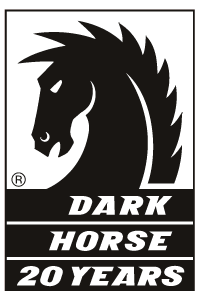 The year 2006 marks the twentieth anniversary of Dark Horse Comics - quite an achievement for any company, much less a company that produces comic books. From the publication of the first issue of Action Comics in the late '30s until today, only a handful of the many publishers coming onto the scene have survived even ten years. I believe there is a reason for our success.
The year 2006 marks the twentieth anniversary of Dark Horse Comics - quite an achievement for any company, much less a company that produces comic books. From the publication of the first issue of Action Comics in the late '30s until today, only a handful of the many publishers coming onto the scene have survived even ten years. I believe there is a reason for our success.In 1986 I called Randy Stradley and told him I was going to begin publishing comic books. I asked him if he'd like to be part of the "start-up" and received an enthusiastic yes. A few short months later, we were pasting up the first issue of Dark Horse Presents on the counter of the comics shop I owned in Beaverton, Oregon. Featuring Paul Chadwick's Concrete, Chris Warner's Black Cross, and Randy's own Mindwalk (drawn by Randy Emberlin), the book was a tremendous success - and our fledgling company was off and running! Our goal was to make comics that we liked, and our first offering embodied all of the elements that we felt would lead to the creation of the best comics anywhere.
First on our minds was the issue of creators' rights. Traditionally, publishers had automatically taken ownership of the stories and characters created by the writers and artists they employed. We were interested in doing things differently. Dark Horse would pay creators page rates that would be competitive with the "big" companies. At the same time, the creators we worked with would retain copyright of their own creations, thus entering into agreements in which both creator and publisher would mutually benefit from the resulting "partnership." It seemed to us that such an environment would lead comics creators to produce their very best work.
We were also interested in extending our reach beyond the fans of the numerous superhero books filling the newsstands. To actually grow the market, comics needed to offer a wide variety of subject matter for a wide variety of interests - or so our own theory went. This meant devoting space in our publishing line to horror, science fiction, adventure, and, yes, even romance titles. We created our own crew of heroes in tights, as well as comic-book sequels to our favorite movies. In other words, we wanted the same bandwidth that other forms of entertainment such as books and films enjoyed.
We also played with format. We believed that the traditional comic book format - the stapled pamphlet measuring roughly 7"x10" - was not always the best way to present an illustrated story. While we had great fondness for the comics of our youth, it occurred to us that some stories might be better presented complete and intact. Almost from the beginning, Dark Horse focused on "graphic novels" and "trade collections," and we presented them in a variety of ways. If a story demanded to be read in one sitting, we devised a format to accommodate. If the art needed to be presented at twice the standard size, so be it. The graphic novel had been invented long before Dark Horse hit the scene, but we certainly expanded its presentation.
Finally, we set out to introduce readers here at home to the work of comics creators from other countries. Druillet, Moebius, Koike, Shirow, and Otomo are just a few of the international comics superstars published by Dark Horse who demonstrated that this original American art form we loved was being practiced magnificently around the world.
Over the years, our approach to comics has led to an amazing list of collaborators, including legends such as Will Eisner, Jack Kirby, Frank Frazetta, Steve Ditko, Burne Hogarth, Doug Wildey, and Al Williamson. We've published the award-winning work of such comics greats as Frank Miller, Mike Mignola, Stan Sakai, Eric Powell, Matt Wagner, and Geof Darrow, to name just a few. We've transferred the literary works of authors such as Andrew Vachss, Harlan Ellison, and Michael Chabon onto the comics page. Looking back, it's been an amazing run.
Today, Dark Horse titles are seen in over fifty countries - an astounding fact in light of our humble beginnings. We've grown, but our goal remains the same: To publish comics that we like to read. We hope you'll take a good look at our line of comics and books. We're sure that if you do, no matter how individual your niche, you'll find what you're looking for: Comics you like to read.
-Mike Richardson